There are times in life when you are faced with sudden and unexpected challenges. At such times the luckiest among us, myself included, have a special someone that is there in their mind and heart, and that gives us enormous strength. Others turn to an inner stoicism and strength, the kind written about by Emily Brontë in a poem written in this week in 1846, one of the most remarkable and iconic poems: ‘No Coward Soul Is Mine.’
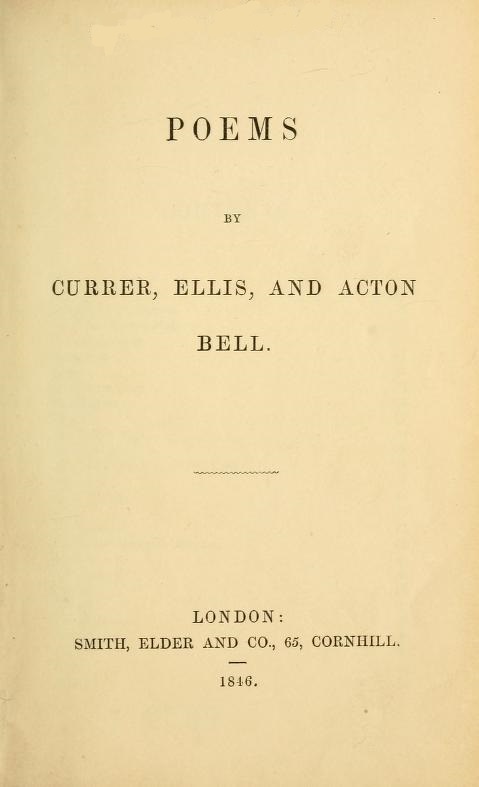
Emily Brontë was a genius of the highest order, everything she turned to (other than meeting people, for she was incredibly shy) she excelled at, and that included poetry. Emily shared her poetry with her sisters Charlotte and Anne from an early age, but she also had a secret notebook of hidden poems which delved into her deep, personal thoughts. It was this book which Charlotte Brontë ‘accidentally’ discovered in 1846, and this led directly to the first published Brontë book and then to the novels the world loves today. Charlotte herself later recalled the event:
‘One day, in the autumn of 1845, I accidentally lighted on a MS. volume of verse in my sister Emily’s handwriting. Of course, I was not surprised, knowing that she could and did write verse: I looked it over, and something more than surprise seized me – a deep conviction that these were not common effusions, nor at all like the poetry women generally write. I thought them condensed and terse, vigorous and genuine. To my ear they had also a peculiar music – wild, melancholy, and elevating.’
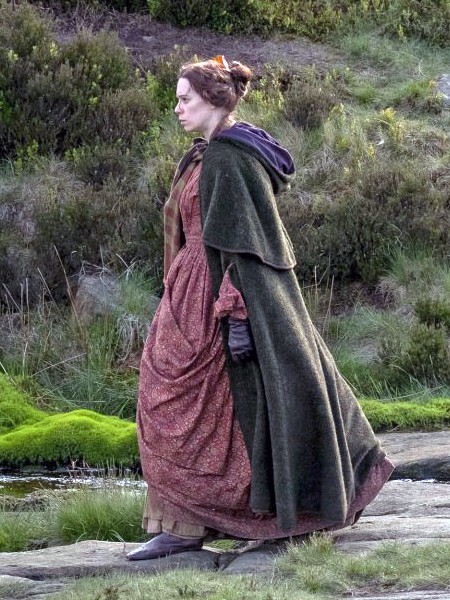
Emily had no intention of her sisters seeing these hidden poems, let alone the whole world, but after a bitter argument Anne Brontë intervened and persuaded Emily to let them submit a joint poetry manuscript to publishers: the result was Poems by Currer, Ellis and Acton Bell and the world of literature was changed forever.
The manuscript, as with most manuscripts then and now, was rejected repeatedly, until on 6th February 1846 it was sent to Aylott & Jones, who agreed to publish the work if the Brontës, or the Bells as the publisher thought they were called, would cover the costs. We know that the sisters must have added poems to the manuscript, however, for perhaps its most celebrated poem was written just 11 days before it was sent to Aylott & Jones: Emily’s handwritten manuscript dates ‘No Coward Soul Is Mine’ to 25th January 1846. Here it is, in this manuscript form, in Emily’s own hand, and then transcribed:
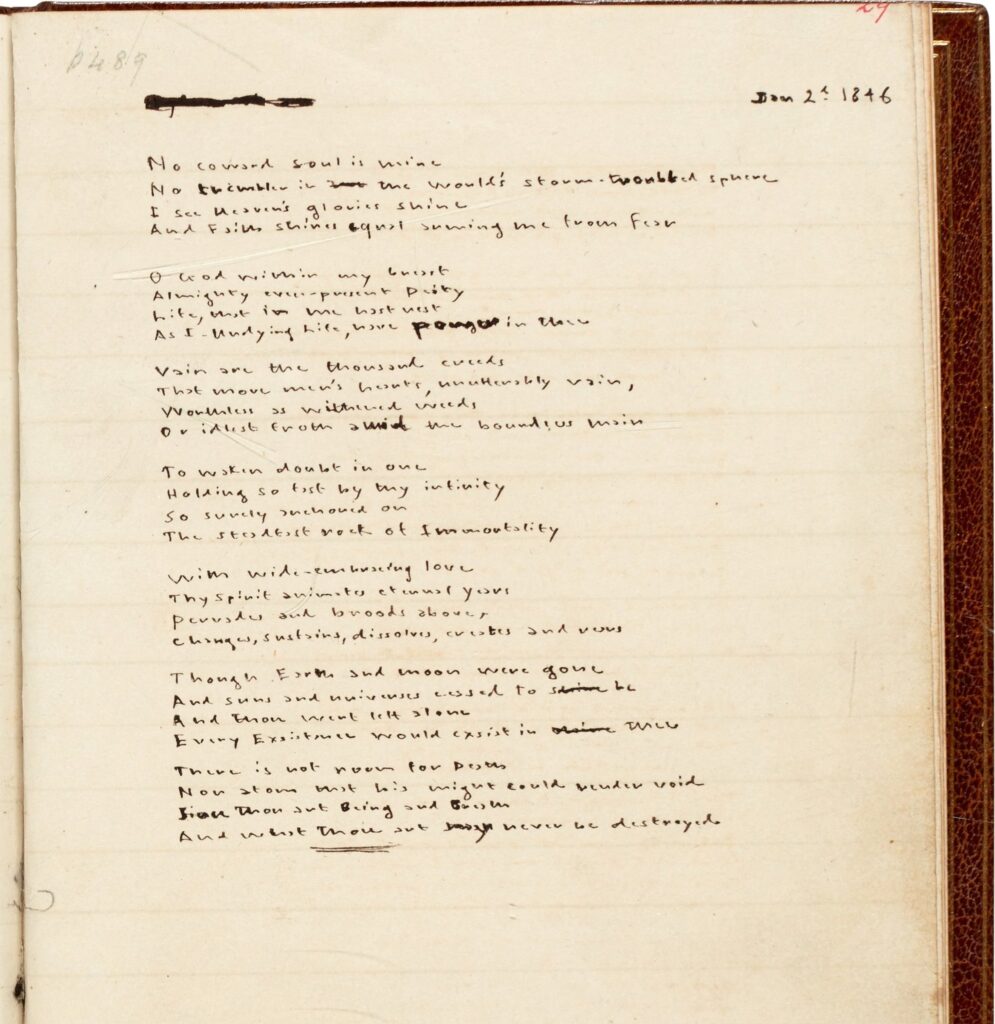
No coward soul is mine
No trembler in the world’s storm-troubled sphere
I see Heaven’s glories shine
And Faith shines equal arming me from Fear
O God within my breast
Almighty ever-present Deity
Life, that in me hast rest,
As I Undying Life, have power in Thee
Vain are the thousand creeds
That move men’s hearts, unutterably vain,
Worthless as withered weeds
Or idlest froth amid the boundless main
To waken doubt in one
Holding so fast by thy infinity,
So surely anchored on
The steadfast rock of Immortality.
With wide-embracing love
Thy spirit animates eternal years
Pervades and broods above,
Changes, sustains, dissolves, creates and rears
Though earth and moon were gone
And suns and universes ceased to be
And Thou wert left alone
Every Existence would exist in thee
There is not room for Death
Nor atom that his might could render void
Since thou art Being and Breath
And what thou art may never be destroyed.
Just what does this poem tell us? It’s a short but complex poem which is open to many interpretations. At one level it is Emily Brontë looking at the nature of faith: she seems to be saying that faith isn’t found in a church or a book, it’s in oneself. Eternal, undying life is inside Emily, and so it needs no organised religion to win it for her. She also seems to attack organised religions as a whole: ‘vain are the thousand creeds that move men’s hearts, unutterably vain.”
And yet, above all, she has faith. It is this faith which provides the ultimate armour against fear – whatever life throws at her, she will face it head on. This sums up Emily’s beliefs and her actions: throughout all the challenges she faced she faced them head on, no coward soul was hers. It is a poem of defiance, of courage, of love for life – and one which still resonates today as it did in 1846. It certainly resonated with the great American poet Emily Dickinson, another trailblazing 19th century writer, who asked for just one poem to be read at her funeral: Emily Brontë’s ‘No Coward Soul Am I.’
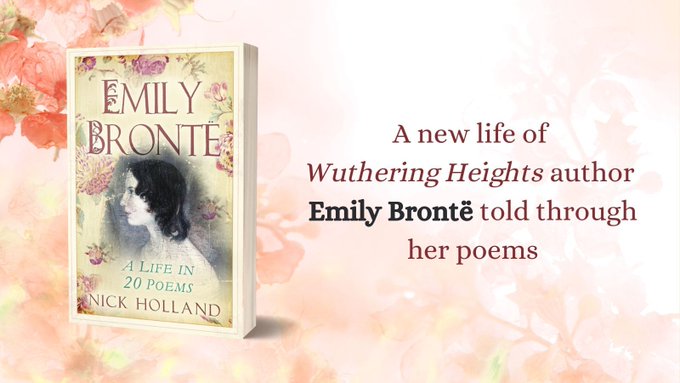
Incidentally, you can read more about Emily and this poem in the new paperback edition of my book ‘Emily Brontë: A Life In 20 Poems’, released by The History Press on Feburary 25th. It’s updated with new sections and even more of Emily and her amazing life and work. I hope to see you here next Sunday for another new Brontë blog post.
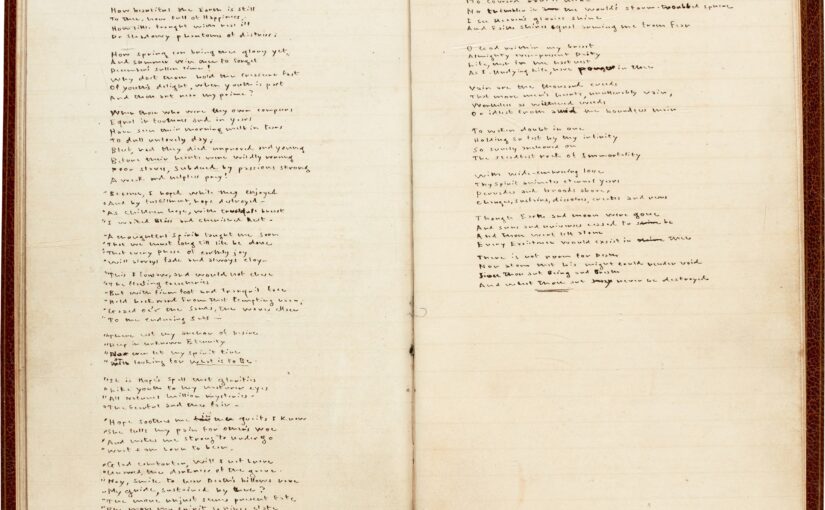
A favourite poem of mine. I’d say Emily had a strong faith,oh god within my breast.
What a marvelous performance Chloe Pirre gave as Emily Bronte, a combination of genius and fierceness which is probably how Emily was. And were there ever three braver sisters than the Brontes? With death all around them Emily, Charlotte and Anne wrote their brilliant novels and celebrated life even though it would not be a very long life. The Bronte sisters are true inspirations for anyone facing adversity.
Thank you for everything you write on that blog dedicated to the Brontës. This post has a special flavor for me. Since I read « No coward soul is mine » in my twenties, it has lived within my breast and will live till my last breath. It owns the power of a mantra which in Buddhist philosophy is unfathomable. It gives not only « Courage to endure » but also the grace to be.